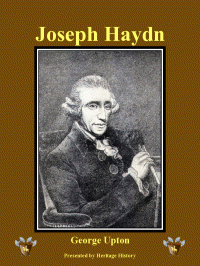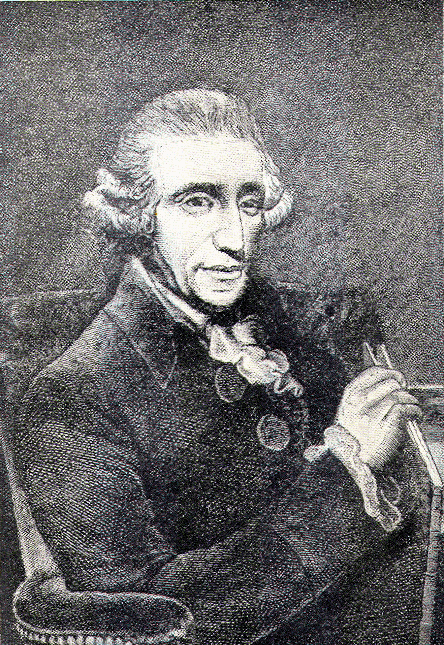Josph Haydn - George Upton |

Haydn was one of the most important and original composers of the 18th century. Although born in Austria, Haydn made many trips to England and was extremely popular throughout all of Europe. He was also a close friend of Mozart and a teacher of Beethoven. He lived an exemplary life and was universally admired. |
![[Book Cover] from Joseph Haydn by George Upton [Book Cover] from Joseph Haydn by George Upton](https://heritage-history.com/books/upton/haydn/front0.gif)
 JOSEPH HAYDN. |
![[Title Page] from Joseph Haydn by George Upton [Title Page] from Joseph Haydn by George Upton](https://heritage-history.com/books/upton/haydn/front2.gif)
![[Copyright Page] from Joseph Haydn by George Upton [Copyright Page] from Joseph Haydn by George Upton](https://heritage-history.com/books/upton/haydn/front3.gif)
Translator's Preface
In the history of music there is not a more lovable character for the young to emulate, or for young musicians to study, than Joseph Haydn. Born in the humblest of abodes, he was offered a home by royalty. Diligent in his business, he stood before kings and was honored by queens. Entering upon his career as a poor choir boy, he became one of the world's greatest masters of tone, and his fame was universal. His career was exceptionally successful and exceptionally long; but not too long for one destined to develop the sonata, the quartet, and the symphony, to enlarge the scope of the orchestra, to become the father of instrumental music, and to pave the way for Mozart and Beethoven, as Bach had paved the way for him.
Haydn was modest to a degree, and yet knew the merits of his own work. He enjoyed the honors so lavishly showered upon him, and yet was free from vain ambition. He always aimed at perfection in his art. His industry was unflagging and his productive power astonishing, a fact which is all the more extraordinary when his originality is considered. His service to music was always joyous. He was his own best critic. He said at one time, speaking of his works: "Some of my children are well-bred; some are ill-bred; and here and there is a changeling among them." These other wordy of his show he knew what he had done for art: "I know that God has bestowed a talent upon me, and I thank Him for it; I think I have done my duty and been of use in my generation by my works. Let others do the same."
Personally, Haydn was lovable by nature; devoted to children, though childless himself; domestic by disposition, though deprived of a happy home life; loyal to his friends; incapable of resentment, even when sorely tried; fond of humor and of a joke; sunny and cheerful of temper; devoutly religious; wholly free from conceit and vanity; and young all his life long. The great loving nature of the master and the great love he received are best revealed by the endearing name which all the world has given him—"Papa Haydn."
NOTE. — In order that this volume may be nearly uniform in size with others in the series of "Life Stories for Young People" the translator has omitted a few passages in the original text. The omissions, however, do not disturb the "life story" in any way, as they include only technical descriptions of certain musical forms which possibly might not be wholly intelligible to young readers, and which in any event can be found in musical dictionaries.
CHICAGO, June 1, 1907.
![[Contents] from Joseph Haydn by George Upton [Contents] from Joseph Haydn by George Upton](https://heritage-history.com/books/upton/haydn/front4.gif)
Appendix
The following is a chronological statement of the principal events in the life of Joseph Haydn:
| 1732 | Born at Rohrau. |
| 1740 | Chorister at Saint Stephen's, Vienna. |
| 1748 | Left Saint Stephen's. |
| 1752 | Composition of first opera, "Der neue krumme Teufel." |
| 1755 | Composition of first symphony. |
| 1759 | Director and Chamber Composer to Count Morzin. |
| 1760 | Married Maria Anna Keller. |
| 1761-1790 | Chapelmaster at Esterhaz. |
| 1785 | Composition of "The Seven Words." |
| 1790-1792 | First London visit. |
| 1791 | Made Doctor of Music at Oxford. |
| 1794-1795 | Second London visit. |
| 1797 | Composition of "The Emperor's Hymn." |
| 1798 | Composition of "The Creation." |
| 1801 | Composition of "The Seasons." |
| 1809 | Death at Vienna. |